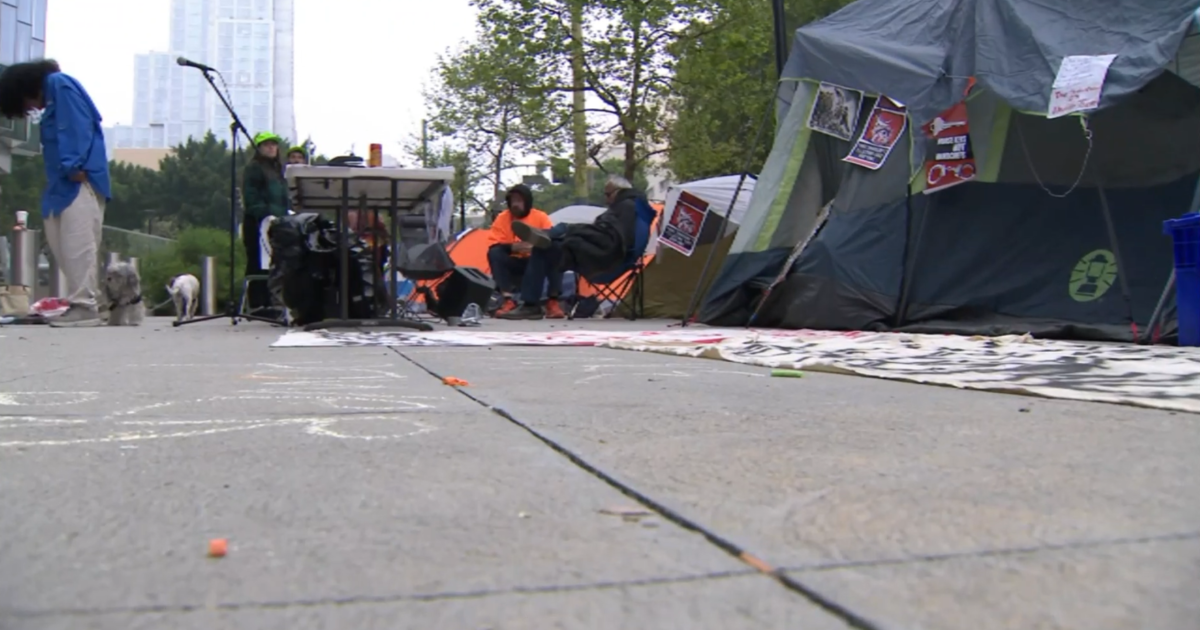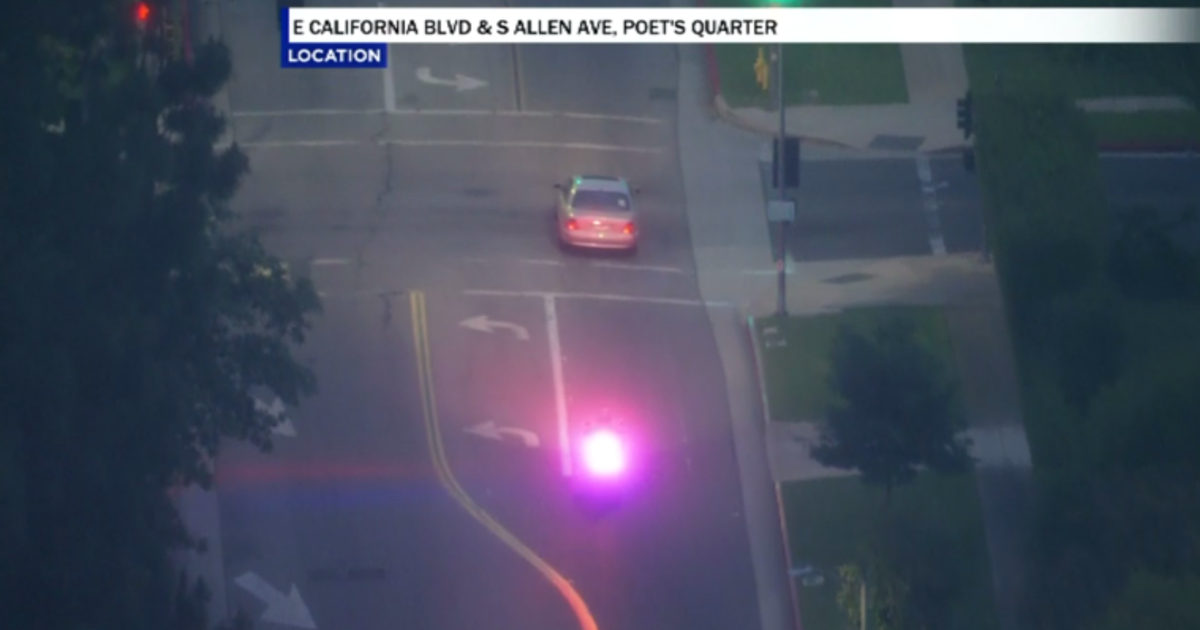Southland Reacts To Staggering Stock Market Plunge
LOS ANGELES (CBS/AP) — Residents across Los Angeles are rattled by the staggering stock market plunge.
The stock market buckled Monday under the weight of a crisis in Europe and danger of recession at home. Reeling from a downgrade of American debt, the Dow Jones industrials plunged 634 points.
It was the worst day for the market since the financial crisis in the fall of 2008 and extended Wall Street's sudden, sharp decline. Stocks have lost 15 percent of their value in just two and a half weeks.
Monday was the first trading day since Standard and Poor's downgraded the United States' risk-free credit rating, and the selling started at the opening bell. The Dow dropped 250 points in minutes. For the rest of the day, investors looked for safer places for their money. With few buyers left for stocks, the market could only drift lower.
Andee, from "LA Easy Meals" tweeted, "Is it bad that I saw a stock market chart the other day and my first thought was that it was a elevation profile with a really great downhill?"
The Dow finished the day down 5.5 percent. The point decline was the worst since Dec. 1, 2008, and the sixth-steepest ever. The average ended at 10,809.85, its first close under 11,000 since November.
In reference to the drop in 2008, Tim Siedell tweeted, "Horrible day to own stocks. Sure glad I lost all my money in the stock market back in 2008."
Economists at Goldman Sachs peg the chances of another recession at one in three, most likely in the next six to nine months. The threat was barely talked about earlier this summer.
The U.S. economy grew at a feeble 0.8 percent annual pace the first half of 2011, its slowest since the end of the Great Recession in June 2009. Manufacturing and consumer spending have slowed dramatically.
Oil prices plunged 6 percent to the lowest price of the year Monday -- $81.31 a barrel. Investors predict a weakening economy means that consumers and businesses will buy less gasoline.
The turmoil in the U.S. markets was the end of a daylong rout that swept the world. Stocks lost 4 percent in South Korea and 2 percent in Japan, then 5 percent in Germany and 4 percent in France.
In the U.S., stocks fell even though Moody's, another major credit rating agency, stood by its top rating of AAA for the United States. It said it could downgrade the U.S. if it did not cut its deficit, "but it is early to conclude that such measures will not be forthcoming."
Financial markets were not comforted by an afternoon statement by President Barack Obama, who said Washington needs more "common sense and compromise" to tame its debt.
"Markets will rise and fall," he said. "But this is the United States of America. No matter what some agency may say, we've always been and always will be a triple-A country."
Matt DeLuca was not comforted by President Obama's statement either. He tweeted, "Hey @BarackObama, I noticed the stock market dropped 600 pts today. Going to your 7 figure fundraiser tonight?"
While Allison Rockey tweeted, "Watching the stock market tank, i feel so justified in my living paycheck to paycheck, no investment lifestyle."
Across the Atlantic, policymakers struggled to contain a debt crisis of their own. The threat of default has spread from relatively small countries like Greece and Portugal to bigger ones -- Italy and Spain.
If those countries failed to meet their debt payments, Italian and Spanish banks would absorb losses on their holdings of their countries' government bonds.
Then the pain could spread outward -- to foreign banks that made loans to Spanish or Italian banks and beyond.
The European Central Bank stepped in Monday, buying billions of euros' worth of Italian and Spanish bonds to drive down dangerously high interest rates. But the move does nothing to address the underlying problem: huge Italian and Spanish debts that could require a bailout and strain the resources of the European Union.
S&P added to the anxieties Friday night by downgrading long-term U.S. government debt -- Treasury securities with maturities of more than a year -- by one notch, from AAA to AA+.
Then on Monday, it downgraded the credit ratings of Fannie Mae, Freddie Mac and other government agencies that rely on the creditworthiness of the federal government.
In withdrawing the top credit rating, S&P blamed political paralysis in Washington. Republicans and Democrats agree on the need to reduce massive annual budget deficits that have left the United States holding $14.3 trillion in debt. But they can't agree how to do it. Republicans refuse to raise tax revenues, and Democrats resist cuts to social programs such as Medicare and Social Security.
But in their first opportunity to buy long-term Treasurys after S&P declared them riskier, investors paid a premium for them. The yield on 10-year Treasury bonds fell to 2.34 percent Monday from 2.56 percent Friday as investors bid prices up.
"What you're seeing amply demonstrated today is that, should there be any question about the stability of the global economic backdrop, the U.S. dollar rises in value, and Treasurys are still the pre-eminent flight-to-quality security in the world markets," said Robert Tipp, chief investment strategist with Prudential Fixed Income.
The drop in Treasury yields signals that investors are more worried about slowing growth than they are about the credit risk posed by the U.S. government. Investors showed Monday that nothing has shaken their confidence that the U.S. will pay its creditors.
Many investors flee to Treasurys when there are signs economic growth is deteriorating. Steven Major, a strategist at HSBC Bank, said 10-year yields could drop as low as 2 percent if the U.S. stumbles back into recession. It fell as low as 2.06 percent during the financial crisis in 2008.
S&P's decision does pose one risk, said Jan Hatzius, Goldman Sachs' chief economist: It could force the U.S. government to cut spending and reduce its budget deficit faster than it would otherwise.
Hatzius is already forecasting that cuts in government spending could reduce U.S. growth by 1 percentage point in 2012. Overall, the U.S. economy is likely to grow a meager 2 percent to 2.5 percent through next year, Hatzius said in a conference call Monday.
But the pressure on policymakers to reduce government deficits could lead to additional steps that will slow growth. For example, the White House and Congress could allow a cut in Social Security taxes to expire at the end of this year, as scheduled. That could subtract another one-half percentage point from the economy's growth rate, Hatzius said, and raise the risk of a recession.
Government spending cuts, especially at the state and local level, are already a drag on economic growth. From April through June, public cuts lowered economic growth, which was running at a weak 1.3 percent annual rate, by 0.23 percentage points.
Since the federal government seems unlikely to do much to stimulate the economy, attention is turning again to the Federal Reserve, which meets Tuesday.
Doug Roberts, chief investment strategist at Channel Capital Research, said the weakening economy and international turmoil mean the odds have "increased substantially" that the Fed will ultimately announce a new round of bond purchases designed to jolt the economy by pushing down long-term interest rates. The Fed ended a $600 billion bond-buying program in June.
"What's rocking the market is a growth scare," said Kathleen Gaffney, co-manager of the $20 billion Loomis Sayles bond fund.
She said the market is worried not about the downgrade but about how the U.S. and Europe will grow their way out of their debt problems.
"The gravity of the situation won't be dealt with until the market continues to riot to get their attention," she said.
(TM and © Copyright 2011 CBS Local Media, a division of CBS Radio Inc. and its relevant subsidiaries. CBS RADIO and EYE Logo TM and Copyright 2010 CBS Broadcasting Inc. Used under license. All Rights Reserved. This material may not be published, broadcast, rewritten, or redistributed. The Associated Press contributed to this report.)



